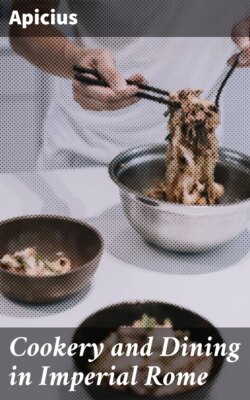Читать книгу Cookery and Dining in Imperial Rome - Apicius - Страница 31
На сайте Литреса книга снята с продажи.
Sumptuary Laws
ОглавлениеTable of Contents
The appetite of the ancients was at times successfully curbed by sumptuary laws, cropping out at fairly regular intervals. These laws, usually given under the pretext of safeguarding the morals of the people and accompanied by similar euphonious phrases were, like modern prohibitions, vicious and virulent effusions of the predatory instinct in mankind. We cannot give a chronological list of them here, and are citing them merely to illustrate the difficulty confronting the prospective ancient host.
During the reign of Cæsar and Augustus severe laws were passed, fixing the sums to be spent for public and private dinners and specifying the edibles to be consumed. These laws classified gastronomic functions with an ingenious eye for system, professing all the time to protect the public’s morals and health; but they were primarily designed to replenish the ever-vanishing contents of the Imperial exchequer and to provide soft jobs for hordes of enforcers. The amounts allowed to be spent for various social functions were so ridiculously small in our own modern estimation that we may well wonder how a Roman host could have ever made a decent showing at a banquet. However, he and the cooks managed somehow. Imperial spies and informers were omnipresent. The market places were policed, the purchases by prospective hosts carefully noted, dealers selling supplies and cooks (the more skillful kind usually) hired for the occasion were bribed to reveal the “menu.” Dining room windows had to be located conveniently to allow free inspection from the street of the dainties served; the passing Imperial food inspector did not like to intrude upon the sanctity of the host’s home. The pitiable host of those days, his unenviable guests and the bewildered cooks, however, contrived and conspired somehow to get up a banquet that was a trifle better than a Chicago quick lunch.
How did they do it?
In the light of modern experience gained by modern governments dillydallying with sumptuary legislation that has been discarded as a bad job some two thousand years ago, the question seems superfluous.
Difficile est satyram non scribere! To make a long story short: The Roman host just broke the law, that’s all. Indeed, those who made the laws were first to break them. The minions, appointed to uphold the law, were easily accounted for. Any food inspector too arduous in the pursuit of his duty was disposed of by dispatching him to the rear entrance of the festive hall, and was delivered to the tender care of the chief cook.
Such was the case during the times of Apicius. Indeed, the Roman idea of good cheer during earlier epochs was provincial enough. It was simply barbaric before the Greeks showed the Romans a thing or two in cookery. The methods of fattening fowl introduced from Greece was something unheard-of! It was outrageous, sacrilegious! Senators, orators and other self-appointed saviors of humanity thundered against the vile methods of tickling the human palate, deftly employing all the picturesque tam-tam and élan still the stock in trade of ever so many modern colleagues in any civilized parliament. The speeches, to be sure, passed into oblivion, the fat capons, however, stayed in the barnyards until they had acquired the saturation point of tender luscious calories to be enjoyed by those who could afford them. How the capon was “invented” is told in a note on the subject.
Many other so-called luxuries, sausage from Epirus, cherries from the Pontus, oysters from England, were greeted with a studied hostility by those who profited from the business of making laws and public opinion.
Evidently, the time and the place was not very propitious for gastronomic over-indulgence. Only when the ice was broken, when the disregard for law and order had become general through the continuous practice of contempt for an unpopular sumptuary law, when corruption had become wellnigh universal chiefly thanks to the examples set by the higher-ups, it was then that the torrent of human passion and folly ran riot, exceeding natural bounds, tearing everything with them, all that is beautiful and decent, thus swamping the great empire beyond the hopes for any recovery.
